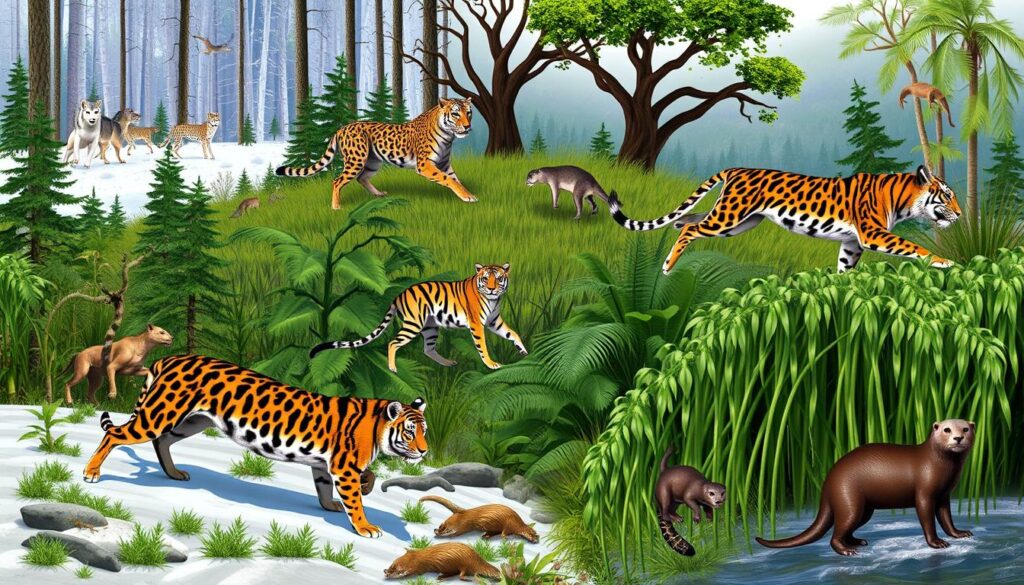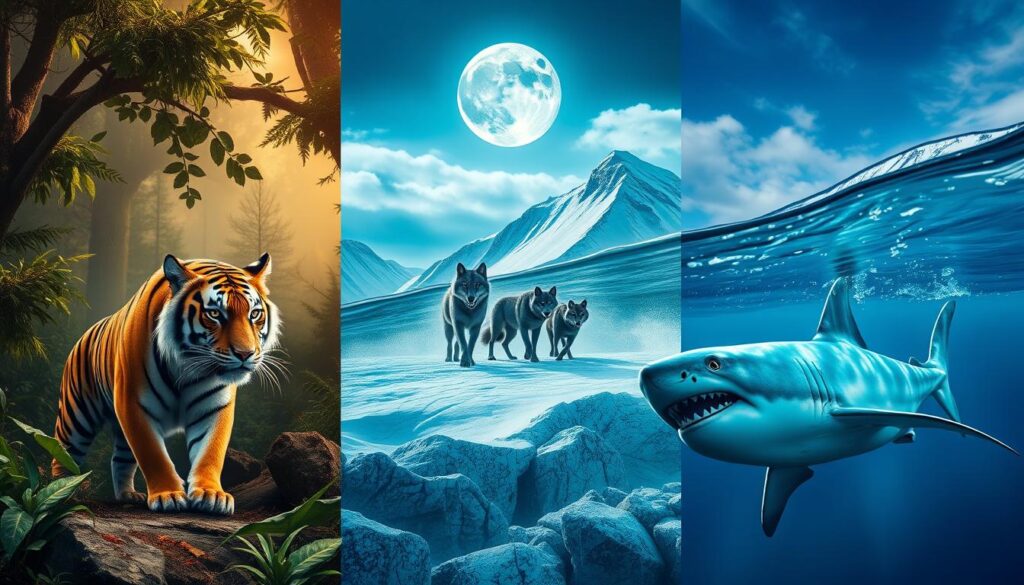
A diverse ecosystem scene featuring various carnivores in their natural habitats, including a majestic wolf pack in a snowy forest, a sleek cheetah sprinting across the African savanna, a powerful tiger prowling through dense jungle foliage, and an agile sea otter hunting in a kelp forest, all showcasing the intricate balance and interactions within the ecosystem.
Carnivores are key to keeping ecosystems in balance. They include lions, tigers, wolves, and sharks. These animals are important for the health of our planet’s biodiversity.
They keep the number of other species in check. This helps ecosystems stay healthy and diverse. Carnivores make sure the balance in nature is maintained, which is good for all living things.
At the top of the food chain, carnivores are nature’s guardians. They control the number of herbivores. This stops overgrazing and keeps plants healthy.
This keeps the whole ecosystem strong. It supports many species and keeps the balance needed for survival.
Key Takeaways
- Carnivores are crucial in maintaining the balance of ecosystems by regulating the populations of other species.
- As top predators, carnivores help prevent the overgrazing of plant life, ensuring the continued health and diversity of the ecosystem.
- The presence of carnivores is essential for the survival and flourishing of a wide range of species within a natural environment.
- Carnivores play a vital role in preserving the delicate balance of the Earth’s biodiversity.
- Understanding the ecological significance of carnivores is crucial for effective conservation efforts and the protection of our natural world.
Understanding Carnivores and Their Ecological Significance
Carnivores are fascinating animals that play a key role in nature. They include lions, wolves, foxes, and hawks. These predators help keep their prey populations in check. This balance is crucial for the health of their habitats.
What are Carnivores?
Carnivores get their food by eating other animals. They can be divided into different groups, like obligate carnivores and scavengers. Each type of carnivore adds to the complex life in ecosystems.
The Diverse Roles of Carnivores in Natural Ecosystems
Carnivores are vital for ecosystems. They keep their prey populations from getting too large. This balance helps many plants and animals thrive, making ecosystems diverse.
They also help control diseases by removing sick animals. This keeps the ecosystem healthy and strong against challenges.
Carnivores help cycle nutrients in the ecosystem too. Their waste and decomposing bodies give nutrients to plants and other animals. This process is key for keeping habitats productive.
Some carnivores are like keystone species. Their presence greatly affects the ecosystem. Saving these predators is important for keeping nature healthy and diverse.
Learning about carnivores’ roles in nature is key to protecting our environment. By valuing these predators, we can help keep nature in balance. This is crucial for the future of our planet.
Carnivores: Maintaining the Balance of Nature

A powerful scene depicting apex predators in their natural habitat, showcasing a majestic tiger prowling through a dense jungle, a sleek wolf pack on a snowy mountain ridge under a full moon, and a fierce great white shark gliding through crystal clear ocean waters, all illustrating the balance of nature and the impressive adaptation of these carnivores.
Carnivores, especially apex predators, are key to keeping nature in balance. They control the number of their prey. This stops overgrazing and keeps the complex web of life stable.
Trophic cascades show how important carnivores are. They affect the whole food web. With carnivores around, they keep their prey in check. This lets lower-level species thrive and keeps the ecosystem stable.
Carnivores are also keystone species. They play a big role in their ecosystems. Without them, the ecosystem changes a lot. This can lead to big problems for the whole system. They help keep the balance, even when the environment changes.
| Ecosystem Role | Importance |
|---|---|
| Apex Predators | Control prey populations, prevent overgrazing, maintain balance |
| Keystone Species | Disproportionately important for ecosystem structure and function |
| Trophic Cascades | Rippling effects of carnivores’ presence or absence on the entire food web |
| Ecosystem Resilience | Carnivores’ role in ensuring the stability of natural systems |
In summary, carnivores, especially apex predators, are vital for healthy ecosystems. They control prey, start trophic cascades, and keep ecosystems resilient. This shows how crucial they are in nature.
“The presence of apex predators is the hallmark of a healthy, balanced ecosystem. Without them, the entire system can unravel.”
Conclusion
This article has shown how crucial carnivores are for keeping ecosystems healthy and balanced. They help control prey populations and support a wide variety of species. It’s important to protect these vital animals as we face issues like habitat loss and climate change.
Carnivores play a key role in ecosystems. They keep prey populations in check, preventing overgrazing. This balance is crucial for nature’s health. Their presence also helps other species thrive, making ecosystems richer and more resilient.
Protecting carnivores and their homes is vital for the future of our planet. We need to work together to save these amazing animals. It’s our duty to keep their important work in nature going for the next generations.
FAQs of Carnivores
What is the role of carnivores in ecosystems?
Carnivores are key to keeping ecosystems balanced. They act as top predators, controlling other species’ populations. This keeps the ecosystem healthy and diverse.
What are the different types of carnivores?
Carnivores range from big predators like lions and tigers to smaller scavengers like hyenas and vultures. Each type has a special role in the ecosystem.
How do carnivores contribute to the overall health of the environment?
Carnivores are crucial for ecosystem balance and resilience. They keep prey populations in check, preventing overgrazing. This supports diverse plant and animal life.
What is the concept of trophic cascades, and how do carnivores influence it?
Trophic cascades show how carnivores affect the ecosystem. Their presence or absence changes the balance. With carnivores around, prey populations are controlled, helping other species thrive and keeping the environment healthy.
Why are carnivores considered keystone species?
Carnivores, especially apex predators, are vital for ecosystem balance. Their presence ensures the ecosystem works well. They play a big role in keeping the environment healthy.
What are the current conservation efforts for protecting carnivores?
Conservation efforts focus on protecting carnivores and their homes. This includes saving habitats, fighting against poaching, and educating the public.

Pingback: Fix this IMMEDIATELY to manifest success! 1
Pingback: Hammer candlestick pattern full informeson
Pingback: खरगोश कछुआ की कहानी-The Story of the Tortoise and the Rabbit
Pingback: NEW खरगोश कछुआ की कहानी - the Story of the Tortoise and the Rabbit
Pingback: खरगोश बंदर की कहानी - The story of the rabbit and the monkey
Pingback: शेर बंदर की कहानी - Story of Lion and Monkey